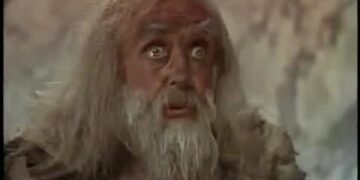In 1965, Frank Herbert published a novel that would become one of the most influential and beloved science fiction stories of all time: Dune.
Set in a distant future, this epic tale explores themes of politics, religion, ecology, and human nature, capturing the imaginations of readers worldwide.
In 1984, director David Lynch adapted the novel into a visually stunning but divisive film.
This article will provide a comprehensive book summary and analysis of both Lynch’s adaptation and Herbert’s original masterpiece, delving into the fascinating world of Dune and its enduring legacy.
A brief synopsis of Dune: book summary and movie summary
Dune tells the story of Paul Atreides, a young nobleman whose family is granted control of the desert planet Arrakis, also known as Dune.
Arrakis is the only known source of the spice melange, a valuable substance with various uses, including extending life and enhancing mental abilities.
The spice is also crucial for space travel, as it allows navigators to safely plot routes through the cosmos.
As the Atreides family takes control of Arrakis, they face treachery from their enemies, the Harkonnens. Paul’s father, Duke Leto, is betrayed and killed, and Paul and his mother, Lady Jessica, are forced to flee into the desert.
There, they encounter the Fremen, the native people of Arrakis, who believe that Paul may be their prophesied messiah.
As Paul adapts to life among the Fremen and hones his newfound powers, he leads a rebellion against the Harkonnens and the tyrannical rule of the Padishah Emperor, ultimately reshaping the fate of the universe.
The 1984 film adaptation of Dune, directed by David Lynch, closely follows the plot of the novel, though it condenses and alters certain elements for the screen.
While the movie was not a commercial success and received mixed reviews, it has since gained a cult following and is praised for its striking visual design and ambitious scope.
The world of Dune: When and where the story takes place
The story of Dune takes place in the distant future, approximately 20,000 years from now. Humanity has spread across the stars, forming a vast interstellar empire known as the Imperium.
The universe is ruled by the Padishah Emperor, who maintains power through a complex web of noble houses, religious institutions, and other organizations.
The most important of these is the Spacing Guild, which controls all space travel through the use of its spice-addicted navigators.
Arrakis, the desert planet at the heart of the story, is a harsh and inhospitable world. Its environment is dominated by vast sand dunes and powerful sandstorms, and its only native lifeforms are the colossal sandworms that burrow through the desert.
Despite these challenges, the planet is of immense strategic importance due to its exclusive supply of the spice melange.
Who’s who: Key characters and their roles
Dune features a rich cast of characters, each with their own motivations and agendas.
Some of the most important figures in the story include:
- Paul Atreides: The protagonist of the novel and film, Paul is the son of Duke Leto and Lady Jessica. He possesses various supernatural abilities, including prescience and the ability to control others through his voice.
- Lady Jessica: Paul’s mother, a member of the Bene Gesserit sisterhood. She is a skilled manipulator and has trained Paul in the ways of the Bene Gesserit.
- Duke Leto Atreides: Paul’s father and the leader of House Atreides. He is a compassionate and honorable ruler who seeks to improve the lives of the people on Arrakis.
- Baron Vladimir Harkonnen: The primary antagonist of the story, Baron Harkonnen is the head of House Harkonnen and the sworn enemy of House Atreides.
- Stilgar: The leader of the Fremen tribe that takes in Paul and Jessica after their escape from the Harkonnens. He becomes a close ally and mentor to Paul.
- Chani: A Fremen warrior and the daughter of Liet-Kynes, the planetologist of Arrakis. She becomes Paul’s lover and a key figure in his rise to power.
Memorable quotes from Dune
Throughout Dune, characters express deep wisdom and profound insights into the human condition.
Here are some memorable quotes from the novel and film:
- “The spice must flow.” – Various characters, emphasizing the importance of the spice melange to the universe.
- “Fear is the mind-killer.” – Bene Gesserit Litany Against Fear, a mantra that Paul and other characters use to overcome fear and maintain focus.
- “He who controls the spice controls the universe.” – Baron Harkonnen, highlighting the strategic importance of Arrakis and its resources.
- “A beginning is a very delicate time.” – Princess Irulan, emphasizing the importance of understanding and establishing context at the start of a story.
The sounds of Dune: Soundtrack by Toto and Brian Eno
The soundtrack for David Lynch’s Dune was composed by the rock band Toto, with additional contributions from legendary musician and producer Brian Eno.
The score is a unique blend of orchestral arrangements, synthesizers, and rock elements, creating a distinctive atmosphere that complements the film’s visuals.
Key tracks include the main theme, “Dune (Desert Theme),” and “Prophecy Theme,” which was composed by Eno.
Curiosities and behind-the-scenes facts about Dune
The production of David Lynch’s Dune was an ambitious and challenging endeavor.
Here are some interesting facts and anecdotes about the making of the film:
- The film’s production designer, Anthony Masters, worked on Stanley Kubrick’s 2001: A Space Odyssey and brought his experience in creating realistic and immersive worlds to Dune.
- Actor Patrick Stewart, who played Gurney Halleck in the film, was not yet widely known for his role as Captain Jean-Luc Picard in Star Trek: The Next Generation.
- The film features several cameo appearances, including musician Sting as the Harkonnen’s sadistic nephew, Feyd-Rautha.
- David Lynch was not the first choice to direct Dune. Before him, filmmakers like Alejandro Jodorowsky and Ridley Scott were attached to the project but ultimately left due to various reasons.
Embracing the Dune universe: Tips for cosplay and dressing like characters
If you’re a fan of Dune and want to immerse yourself in its universe, one way to do so is through cosplay and dressing up as your favorite characters.
Here are some tips to get started:
- Research the character’s outfits in detail, using reference images from the film or illustrations from the novel. Pay attention to the fabrics, colors, and accessories used to create an authentic look.
- Incorporate elements of the desert environment, such as sand-worn fabrics and weathered accessories, to capture the essence of Arrakis.
- For Fremen characters, consider using blue contact lenses to replicate their distinctive blue-in-blue eyes, a result of their constant exposure to the spice melange.
- Don’t forget to include iconic props, such as crysknives (the Fremen’s sacred weapons) or the stillsuits that the characters wear to survive in the harsh desert climate.
The man behind the masterpiece: Frank Herbert’s bio and works
Frank Herbert (1920-1986) was an American science fiction writer best known for his Dune series.
Born in Tacoma, Washington, he worked as a journalist and photographer before turning to full-time writing.
Dune was initially published in 1965 after being rejected by multiple publishers and went on to win the prestigious Hugo and Nebula Awards for Best Novel.
Herbert wrote five sequels to Dune, creating an expansive and complex universe that continues to captivate readers today.
In addition to the Dune series, Herbert wrote numerous other novels and short stories, often exploring themes of ecology, psychology, and the consequences of absolute power.
Some of his other notable works include Destination: Void, The Dosadi Experiment, and The White Plague.
Understanding the ending: Dune’s conclusion explained
At the end of Dune, Paul Atreides has successfully defeated both the Harkonnens and the Padishah Emperor, securing control of Arrakis and its invaluable spice.
As ruler of the planet, Paul has the power to control the supply of the spice and, by extension, the entire universe.
He marries the Emperor’s daughter, Princess Irulan, to consolidate his power and ensure the loyalty of the other noble houses, although his true love remains Chani.
The ending of Dune highlights the cyclical nature of power, as Paul, who once sought to overthrow the oppressive rule of the Emperor, now finds himself in a position of ultimate authority.
The story also raises questions about the nature of destiny and the consequences of unchecked power, themes that are further explored in the subsequent novels in the series.
The Dune legacy: Remake, sequel, spin-off, and other media adaptations
The enduring popularity of Dune has led to numerous adaptations and expansions of the universe, including:
- A 2000 miniseries titled Frank Herbert’s Dune, which aired on the Sci-Fi Channel and received critical acclaim for its faithful adaptation of the source material.
- A 2003 sequel miniseries, Frank Herbert’s Children of Dune, which adapted the second and third novels in the series, Dune Messiah and Children of Dune.
- A series of prequel and sequel novels written by Frank Herbert’s son, Brian Herbert, and science fiction author Kevin J. Anderson, which further explore the history and future of the Dune universe.
- A highly anticipated 2021 film adaptation directed by Denis Villeneuve, featuring an all-star cast including Timothée Chalamet, Rebecca Ferguson, and Oscar Isaac. The new adaptation is intended to be the first in a series of films covering the entire Dune saga.
David Lynch beyond Dune: Other notable works
While Dune remains one of David Lynch’s most well-known films, the director has built a reputation for his unique and often surreal storytelling style across a range of other projects.
Some of his most notable works include:
- Eraserhead (1977): Lynch’s debut feature film, a surreal and haunting exploration of the anxieties of parenthood.
- Blue Velvet (1986): A neo-noir thriller featuring Kyle MacLachlan, who also starred as Paul Atreides in Dune.
- Twin Peaks (1990-1991, 2017): A groundbreaking television series blending mystery, drama, and supernatural elements, which has become a cult classic.
- Mulholland Drive (2001): A psychological thriller that explores the dark side of Hollywood and the nature of dreams and reality.
Similar media to explore: Books, movies, and TV shows for Dune fans
If you’re a fan of Dune and looking for similar stories to dive into, consider exploring the following books, movies, and TV shows:
- Foundation series by Isaac Asimov: A landmark science fiction saga exploring the rise and fall of a galactic empire.
- Hyperion by Dan Simmons: A complex and multi-layered space opera that weaves together various characters and narratives in a richly imagined universe.
- Star Wars franchise: George Lucas’s iconic space opera, which was partly inspired by Dune and shares themes of political intrigue, personal destiny, and the struggle for power.
- Game of Thrones series by George R.R. Martin and its television adaptation: A sprawling fantasy epic with complex characters, political intrigue, and a richly detailed world.
Delving deeper into Frank Herbert’s universe: Other works by the author
Beyond the Dune series, Frank Herbert wrote numerous other novels and short stories that showcased his talent for creating intricate and thought-provoking worlds.
Some of his other works worth exploring include:
- The Dosadi Experiment: A standalone novel set in the same universe as Dune, exploring themes of power, manipulation, and survival.
- Destination: Void and its sequels: A series of novels centered around a group of astronauts on a perilous mission to colonize a distant planet.
- The White Plague: A standalone novel in which a vengeful scientist unleashes a deadly plague upon the world, exploring themes of responsibility, ethics, and the consequences of unchecked power.
Engaging with Dune: Book club questions and discussion points
Discussing Dune with fellow fans, whether in a book club or informal conversation, can provide new insights and perspectives on the story.
Here are some questions and discussion points to consider:
- How does the environment of Arrakis shape the characters and their actions throughout the story?
- What role does religion play in the Dune universe, and how do different characters use and manipulate religious beliefs to their advantage?
- How do the themes of power, control, and destiny manifest in the story, and how do they relate to the characters’ personal struggles and motivations?
- In what ways does the Dune series comment on contemporary issues such as environmentalism, politics, and human nature?
Dune in the gaming world: Video games inspired by the story
The rich world of Dune has inspired several video games that allow players to immerse themselves in the universe and take part in its epic conflicts:
- Dune (1992): A strategy-adventure game that combines resource management and narrative elements, allowing players to control Paul Atreides as he battles the Harkonnens for control of Arrakis.
- Dune II: The Building of a Dynasty (1992): A real-time strategy game that pioneered many of the genre’s conventions and is considered a classic in the field.
- Emperor: Battle for Dune (2001): A 3D real-time strategy game in which players control one of three factions vying for control of Arrakis.
A journey to Arrakis: Travel guide to visit Dune film locations
While visiting the fictional planet of Arrakis may not be possible, fans can still explore some of the real-world locations used in the filming of David Lynch’s Dune and other adaptations.
Some notable film locations include:
- Samalayuca Dune Fields, Mexico: The primary location for the desert scenes in Lynch’s Dune, these expansive sand dunes provided the perfect backdrop for the harsh environment of Arrakis.
- Wadi Rum, Jordan: This stunning desert landscape, known as the “Valley of the Moon,” was used as a filming location for the 2021 Dune adaptation directed by Denis Villeneuve.
- Royal Palace of Caserta, Italy: This 18th-century palace served as the setting for the Imperial Palace in Lynch’s Dune, as well as locations in the 2000 miniseries.
Conclusion
Dune remains a timeless and powerful story that has captured the imaginations of readers and viewers for generations.
By exploring the depths of the novel, the film adaptations, and the wider universe created by Frank Herbert, fans can continue to discover new insights and connections within this rich and complex world.
Whether you’re a longtime devotee or a newcomer to the sands of Arrakis, there is always more to uncover in the ever-shifting landscape of Dune.













